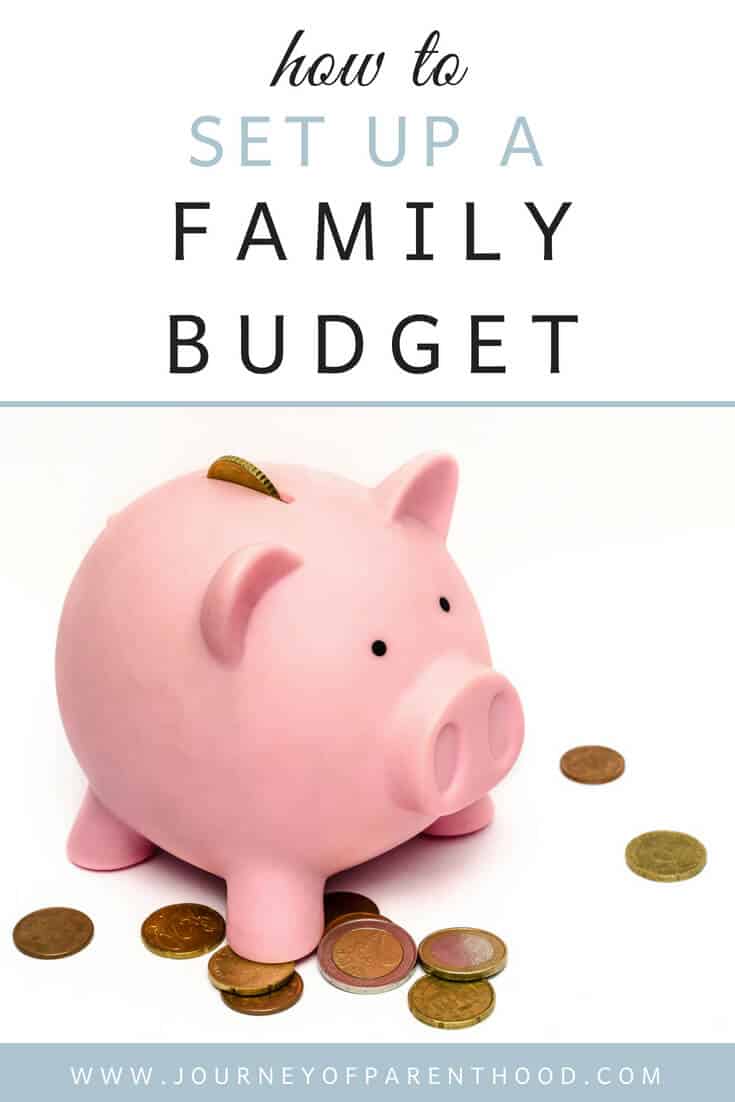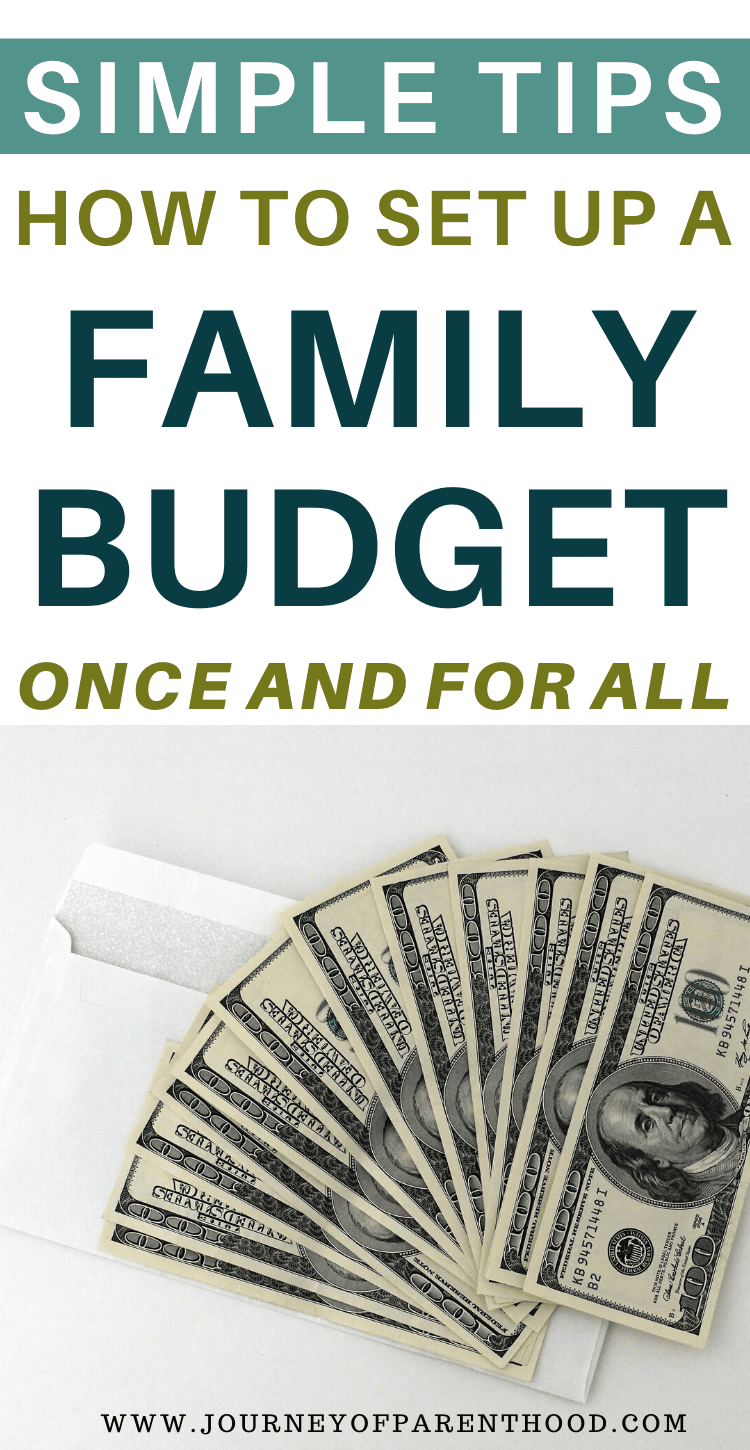When you have a family to take care of, knowing how to spend smart and budget well is a life skill that will not only help your finances, but also your peace of mind. The budgeting tips for families that I’m about to share are simple and practical! We’ve had major success with them, but just remember that you can customize them to fit your family’s unique situation!
This post was originally published on Mama’s Organized Chaos
Originally published on this blog on September 4, 2018 as Spending Smart: How to Set Up a Family Budget
Disclaimer: post contains affiliate links.
Budgeting Tips for Families: How to Set Up a Family Budget
I am a big believer in “spending smart” and living within a budget.
After reading Dave Ramsey’s Total Money Makeover a few years ago I did a complete and total overall of our family budgeting and how we spent our money. It’s been LIFE CHANGING for our family. (You can read that post here!)
My husband is less stressed with work because he knows exactly how much he needs to make to provide for us (he’s self employed and commission only).
It is less stressful for me as the one who manages our finances because I know exactly where the money he earns is going to go each month.
It takes the guesswork out.
It takes the fears away.
It allows our money to truly work for us instead of us working for our money.
We never have arguments over finances and have enjoyed seeing where our money goes!
Where to Start With Budgeting
If you’re ready to set up a family budget you want to get together all your recent bills and be prepared to be a bit shocked at just where all of your money is going.
I do not think you have to sit down as a couple to create your budget.
I always handle the finances so it made the most sense for me to set up our budget and then discuss it with my husband.
This was less stressful for both of us rather than sitting down together to go over it.
It’s something that some couples may enjoy doing together, but going through the hard numbers could also be an argument in the making.
Don’t focus on past spending, focus on the future and use the past only as a bouncing off point to where you want to be!
It is best to go back a full year to REALLY see where your spending has been taking place.
Having a full year allows you to see utilities that fluctuate (electric bill may be higher in winter and lower in spring etc) as well as budget for times of the year where spending is higher on extra items (like the holidays).
Now that you have everything gathered together, it’s time to get into the budgeting tips for families, starting with how to calculate your expenses.

Budgeting Tips for Families: Listing Expenses
1. List all Debts:
Anything other than your mortgage that you have to pay payments on is considered debt.
Car payment, student loans, medical bills, other loans, credit card balances.
All of this needs to be listed out. You need to both write out how much you owe AND what each monthly payment is.
Do NOT be concerned with interest amounts.
2. List all “Must Spend” Expenses:
This category is all of your bills.
House payment, utilities, cell phones. All the monthly things you pay for!
Again if you list out the amounts each month for a full year you’ll be able to get a nice average monthly amount to base things from.
3. List all Extra Expenses:
It’s important here to be honest.
If you pay using a credit card it’s easy to print off a few of the past months statements and REALLY add it up.
How much do you spend on groceries? Entertainment? Eating out? Clothing for the kids? Activities as a family?
Write it ALL down.
4. List all Sporadic Set Expenses:
Many bills aren’t monthly.
You may have an HOA fee due once a year, or your car insurance premium may be every 6 months, school costs once a year.
Any bill that you pay for anytime of the year, be sure to write down that amount.
I like to go ahead and put it as a yearly amount total, even if it’s paid quarterly or semi-annually as that’s an easier figure to work with.
5. Consider Holidays and Travel:
There are so many holidays throughout the year.
Aside from the biggies like birthdays and Christmas you have Mother’s Day, Father’s Day, other family member birthdays, even teacher appreciation gifts!
All of these events add up and cost money and it’s important to list out what you typically spend.
I personally list mine out per person, per holiday.
So I’ll list all the people we buy birthday gifts for and what we spend as well as the same for Christmas, etc.
It’s also important to figure in costs for travel.
If you go on a yearly trip as a family, you need to specify that in your budget too to make sure you have the funds to have those experiences!
Looking for more tips on how to budget for traveling? Be sure to see this post from Mommy Baby Life!

Budgeting Tips for Families: Setting Up the Budget
Once you have it all written out you can clearly see WHERE all of your money is going.
If you make it so you have a total figure for they year then divide that by 12 you have roughly what you currently “need” a month to support the current lifestyle you’re living.
Now that you know what money you are spending…you can start budgeting!
Just seeing where your money is going can create a state of pride…or panic.
Maybe you’re already spending less than what you make each month.
But most likely? You’re probably not looking for budgeting tips for families if you’re walking around with all kinds of extra money lying around 😉
Chances are seeing the hard numbers of where your money has been going will leave you feeling a bit stressed and possibly even make you want to puke.
It’s probably clear right away what areas you can cut back on.
Do it!
As you write out your new budget for yourself and your family… cut down on the areas that can be cut down on.
1. Keep it Basic:
Write out all of those monthly items and their totals.
Your mortgage is a set amount.
Other bills may fluctuate but you can look back at the past amounts and have a solid average to work with.
I have all mine on an Excel spreadsheet.
I have the item and then the monthly average cost for that item written beside it.
Yes, some months the electric bill will be higher than that average and some months it’ll be lower but if I base it off an average and then work to do what I can to lower the bill overall then I should be okay!
2. Set Up an Emergency Fund:
One of the most important budgeting tips for families is to consider emergencies will, and do, happen.
You may find yourself needing new tires. A kid could break an arm.
Things come up. Life is filled with unexpected experiences. You need to plan for them!
Dave Ramsey recommends starting off with $1,000 in savings as an emergency fund.
Already have more than that in a savings account? Awesome… we’ll get to that in a minute.
But if you don’t have $1,000 to set aside for an emergency fund then this needs to be your FIRST goal in your budgeting.
You need to cut back on spending in every possible area in order to get that $1,000 in savings.
Once you have it. Keep it there.
When you have to spend it, stop everything else you’re doing in paying down debt and refill that emergency fund.
3. Set Up Lump Savings:
Remember how we mentioned costs throughout the year that aren’t monthly?
It’s important to set aside money to cover those costs.
Since you already divided those costs out to have a “monthly amount” it’s not hard to add that into your monthly budget.
If you’re car insurance is $1200 a year you will need to set aside $100 a month to have the amount needed to cover the bill when it’s due.
Often times many bills reward you for paying them in a yearly lump sum.
Find out if any of your monthly expenses can be saved by paying them yearly (We save 25%, for example, for paying for our pest control on a yearly basis. And the same is true for our alarm system monitoring service) and then set aside the amounts needed to be able to make that one large payment!
By setting aside the money needed each month, it takes the stress out from when the bill comes due.
No more scrambling because the car insurance is due this month.
You already have the money ready and waiting to mail off!

4. Tithing:
Tithing is a personal topic and one that has to be decided between yourself and your spouse.
For us personally we never stopped tithing at any stage in our budgeting process.
Our belief is that all things from from the Lord and we knew we could never out give Him.
We tithe before we do anything else in our budget for the month.
He gets our money first and we are mindful of that when creating our budget.
When I know a total that my husband needs to make a month to cover our expenses, I be sure to add in the percentage with tithe so he makes enough to cover the tithing as well as all our bills!
5. Snowball Debt:
Once you have your budget in place (including that emergency fund!) it’s important to focus on your debts.
First of all, only plan to pay the minimum amount due on each of the debts you have.
When we first did our budget we were paying “a little extra” on several of our debts. Dave says not to do this.
Instead you should have your list written out from lowest overall amount due to the highest overall amount due.
For example if you owe $10,000 on your car and the monthly payment is $300 and you owe $50,000 in student loans and the monthly payment is $100 you would write out the car payment first on your list because it’s the smallest total overall even though it’s the higher monthly payment amount.
As you begin to cut corners and lower payments and bills or have ANY extra money that you aren’t spending…you designate that to
Every single little extra penny should be going towards paying off that car payment.
This includes any money you currently have in savings.
Let’s say you have a savings account with $5,000 in it.
You need to keep $1,000 in that account for your emergency fund and then GUT the remaining $4,000 in the account and apply that to your lowest overall debt to help get the paying off going quickly!
We were in this situation.
We had a savings account set up for our son when he was born and had been saving in that account for him.
But when we set our budget?
We gutted the account in order to start snowballing that debt.
Once your debts are paid off you can set back up those savings accounts!
So it’s not “gone forever” it’s just a PAUSE in the savings in order to be able to save a LOT more in the future!
Then, once your car is paid off (it may sound crazy but this will happen SO MUCH FASTER than you think!!!) you take ALL THAT MONEY you have been applying to your car payment and now apply it to the next lowest overall debt on your list (in this example, the student loan).
So now the student loan would still get the $100 monthly payment but it’d also be getting the $300 payment you were paying on the car PLUS all the extra money you were paying on top of the car payment amount to help get it paid off quicker.
Every single extra penny you have now goes to that student loan debt.
It’s incredible to watch how the paying off debt truly snowballs.
We were shocked and amazed when just in a matter of months we paid off over $20,000 in medical debt we had.
It works yall! Keep at it and before you know it you’ll be DEBT FREE!
6. Cut Corners:
It can be hard to cut back.
When you first write out your budget you will see some obvious things you can do.
Maybe you’ve been overpaying on your cell phone and can get a cheaper plan to save money.
Or you realize you have to stop eating out at lunch and can save a ton by packing lunch instead.
Some things are easy to cut back on and even the smallest changes really add up when it comes to saving money and snowballing debt!
Some people go pretty extreme in cutting their corners.
Dave Ramsey has tons of examples.
He suggests selling your car that has a high car payment and instead buying a “junker” with cash until you can save up enough to buy a better car.
Some people move into cheaper homes.
Or go on savings sprees where they get creative and don’t spend ANY money outside of their necessities to live.
You can get as hardcore as you want or be as chill as you want too.
Obviously the more intense you are in your savings and paying off debts, the sooner you’ll be living a debt-free life.
Personally? We found a balance that suits us.
It’s important to us to travel as a family and create those experiences so we drastically cut back in other areas (we rarely eat out, always pack lunches, our kids wear clothing from consignments etc) in order to still prioritize our family trips.
I believe a healthy balance is important.
YES you can save, save, save and that’s awesome but we also need to live for the now too and don’t want to look back in our later years and have tons of money in our pockets but have missed out on creating priceless memories with our children while they were young!
There are many more elements to the paying off of debts.
Budgeting Tips for Families: Final Thoughts
Dave Ramsey goes into tons more detail in his book, Total Money Makeover, and discusses what to do once you are debt-free (college savings, retirement, charities, etc).
It can be overwhelming when you’re first starting out so I think it’s important to focus on the small steps. One thing at a time to get to that larger goal!
I encourage you to sit down TODAY and set up a budget for your family. Not only will it allow you financial freedom, but it will allow you such a less-stressed life!
I’m super proud of my sweet friend, Katrina, and how well her family is doing in their efforts to spend smart. Here’s her post about their family budgeting!
You should also check out this post by Love Our Real Life on 7 Budget Tips to Help Save Money!
Want more budgeting tips for families so you can spend smarter? Here are some of my other budget related posts:
- Teaching Kids How To Spend Smart
- Spending Smart: Eating out as a Family
- Spending Smart: Online Shopping
- Spending Smart: Groceries Once A Month!
- Spending Smart: How We Afford Disney
- A Letter to my Son on His 16th Birthday From Mom (Kye’s Bday Letter) - March 20, 2025
- Open Letter to my Daughter on her 12th Birthday – Love, Mom {Britt’s 12th Bday Letter} - January 16, 2025
- Letter to My Son on his 6th Birthday – Love Mom - January 8, 2025







We use a software called You Need A Budget (YNAB) and it was life changing to really see where our money went and to be more in charge of it.